Lebanon is a parliamentary democratic republic within the overall framework of confessionalism, a form of consociationalism in which the highest offices are proportionately reserved for representatives from certain religious communities. The constitution of Lebanon grants the people the right to change their government. Article 7 of Lebanon's Constitution also states that all Lebanese are equal before the law, and are "equally bound by public obligations and duties without any distinction", meaning that all Lebanese citizens – politicians included – are to be held to the same standards of the law, and yet this is not the case. However, from the mid-1970s until the parliamentary elections in 1992, the Lebanese Civil War (1975–1990) precluded the exercise of political rights.
Secularism is the principle based in secular humanism that seeks to conduct human affairs based on secular, naturalistic considerations. It is most commonly defined as the separation of religion from civic affairs and the state, and may be broadened to a similar position concerning the need to remove or to minimize the role of religion in any public sphere. The term "secularism" has a broad range of meanings, and in the most schematic, may encapsulate any stance that promotes the secular in any given context. It may connote anticlericalism, atheism, naturalism, non-sectarianism, neutrality on topics of religion, or the complete removal of religious symbols from public institutions.

Ferdinand Édouard Buisson was a French academic, educational bureaucrat, pacifist and Radical-Socialist politician. He presided over the League of Education from 1902 to 1906 and the Human Rights League (LDH) from 1914 to 1926. In 1927, the Nobel Peace Prize was awarded to him jointly with Ludwig Quidde. Philosopher and educator, he was Director of Primary Education. He was the author of a thesis on Sebastian Castellio, in whom he saw a "liberal Protestant" in his image. Ferdinand Buisson was the president of the National Association of Freethinkers. In 1905, he chaired the parliamentary committee to implement the separation of church and state. Famous for his fight for secular education through the League of Education, he coined the term laïcité ("secularism").
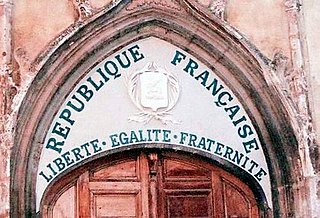
Laïcité is the constitutional principle of secularism in France. Article 1 of the French Constitution is commonly interpreted as discouraging religious involvement in government affairs, especially religious influence in the determination of state policies. It also forbids government involvement in religious affairs, and especially prohibits government influence in the determination of religion. Secularism in France does not preclude a right to the free exercise of religion.
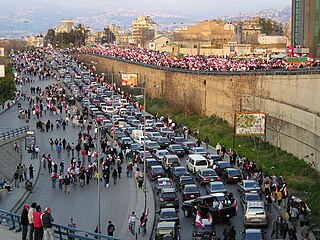
The Cedar Revolution or Independence Uprising was a chain of demonstrations in Lebanon triggered by the assassination of former Lebanese Prime Minister, Rafik Hariri. The popular movement was remarkable for its avoidance of violence, peaceful approach, and its total reliance on methods of civil resistance.

The Democratic Left Movement is a nonsectarian and a democratic leftist political party. It was founded in September 2004 by left-wing and center-left intellectuals and activists some of whom had previously split from the Lebanese Communist Party (LCP) while some were student activists from the "Independent Leftist Groups". The DLM affirms a European-style social democracy—but is open to all forms of leftism and encourages the development of a true secular state. The party operates under a decentralized framework that emphasizes diversity of thought for a progressive society in a liberal democratic environment. It participated in the 2005 Cedar Revolution, a wave of demonstrations against the Syrian occupation of Lebanon, and calls for correcting imbalanced relations with Syria.
Human rights in Lebanon refers to the state of human rights in Lebanon, which were considered to be on par with global standards in 2004. Some believed to be criminals and terrorists are said to be detained without charge for both short and long periods of time. Freedom of speech and of the press are ensured to the citizens by the Lebanese laws which protect the freedom of each citizen. Palestinians living in Lebanon are heavily deprived of basic civil rights. They cannot own homes or land, and are barred from becoming lawyers, engineers and doctors. However the Lebanese government has reduced the number of restricted jobs and created a national dialogue committee for the issue. During the Arab Spring, Lebanon experienced major protests and sectarian violence, but avoided the large-scale political upheaval seen in many parts of the Arab world.

Lebanon is an eastern Mediterranean country that has the most religiously diverse society within the Middle East, comprising 18 recognized religious sects. The primary religions are Islam and Christianity. The Druze are about 5% of the citizens. Outside of Lebanon, Lebanese people are mostly Christians. It is also estimated that a large proportion of its population are refugees which affects statistics. The refugees, mostly Syrian or Palestinian, are predominantly Sunni but also includes Christians and Shia.

The roles of women in Lebanon have evolved throughout history. Lebanon is known for its active feminist movements in the Arab region. Lebanese women obtained women's suffrage on February 8, 1953. Since that time, Lebanese women showed great progress towards sustainable empowerment goals. In 1997, Lebanon acceded to the Convention on the Elimination of All Forms of Discrimination Against Women (CEDAW). In 1998, Lebanon established the National Commission for Lebanese Women (NCLW).
Secularism—i.e. the separation of religion from civic affairs and the state—has been a controversial concept in Islamic political thought, owing in part to historical factors and in part to the ambiguity of the concept itself. In the Muslim world, the notion has acquired strong negative connotations due to its association with removal of Islamic influences from the legal and political spheres under foreign colonial domination, as well as attempts to restrict public religious expression by some secularist nation states. Thus, secularism has often been perceived as a foreign ideology imposed by invaders and perpetuated by post-colonial ruling elites, and is frequently misunderstood and conflated as equivalent to irreligion or anti-religion.
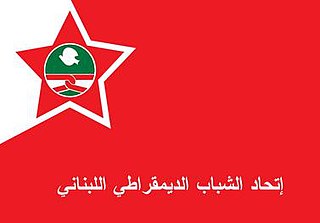
Union of Lebanese Democratic Youth (ULDY), also known as UJDL, is a Lebanese leftist secular democratic youth organization as it defines itself in its documents. ULDY was legally established in 1970 by leftist—mainly communist—students and young activists, after being active underground since 1945.
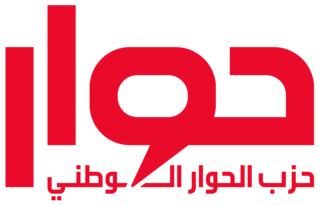
The National Dialogue Party is a secular Lebanese political party founded by businessman, industrialist, philanthropist and engineer Fouad Makhzoumi in 2004. It currently has one seat in the Parliament of Lebanon. The party publishes the Al Hiwar newspaper. Its main office is in the Marj el Zouhour Building, Dona Maria Street in Ras el Nabeh, Beirut.
The Ramallah Center for Human Rights Studies (RCHRS) is an independent Palestinian non-profit and non-governmental organization that advocates human rights, democracy and tolerance from a secular perspective. It conducts theoretical and applied research, publishes studies and journals, operates educational programs and workshops and undertakes advocacy work. Its headquarters are in Ramallah and it has an office in Gaza.

The 2011 Lebanese protests, also known as the Intifada of Dignity or Uprising of Dignity were seen as influenced by the Arab Spring. The main protests focused on calls for political reform especially against confessionalism in Lebanon. The protests initiated in early 2011, and dimmed by the end of the year. In another aspect of the Arab Spring, Lebanese pro and anti-Assad factions descended into sectarian violence, which culminated in May–June 2012.
The Arab Spring unrests and revolutions unfolded in Tunisia, Egypt, Libya, Yemen, Syria and Bahrain, and in the rest of the region, some becoming violent, some facing strong suppression efforts, and some resulting in political changes.
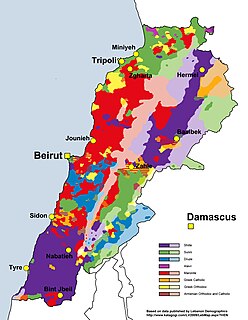
Irreligion is very uncommon in Lebanon, as Islam and Christianity are the predominant faiths. It is difficult to quantify the number of atheists or agnostics in Lebanon as they are not officially counted in the census of the country. The Lebanese Constitution guarantees the freedom of belief. There is a great stigma attached to being an atheist in Lebanon, thus many Lebanese atheists communicate via the internet. It is difficult not to have your religion stated at birth, although a baby made history in doing so in 2014.

The Centre d'action laïque is the umbrella organisation of numerous secularist associations in French-speaking Belgium since 1969. It is integrated in the Central Secular Council, which also coordinates deMens.nu in Flanders.

Lebanese Laïque Pride, also Laïque Pride, Laic Pride, or Secular Pride, is a Lebanese secularist group. It broadly advocates for secularism, women's rights, and media freedom. The group advocates for "equality among all Lebanese citizens and the separation of religion and politics." The group is opposed to confessionalism.

The 17 October Protests, commonly referred to as the 17 October Revolution is a series of civil protests taking place in Lebanon. These national protests were triggered by planned taxes on gasoline, tobacco, and VoIP calls on applications such as WhatsApp, but quickly expanding into a country-wide condemnation of sectarian rule, the stagnation of the economy, unemployment, endemic corruption in the public sector, legislation that was perceived to shield the ruling class from accountability and failures of the government to provide basic services such as electricity, water, and sanitation.
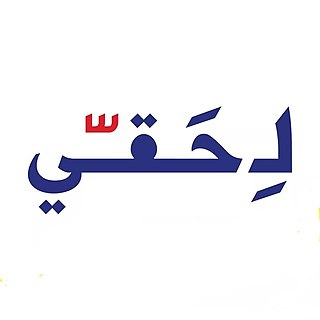
Lihaqqi is a grassroots progressive political organization in Lebanon. Founded as a youth-led campaign for the 2018 parliamentary elections, it soon became a prominent anti-establishment movement that played a major role in instigating the 2019 protest movement. Lihaqqi's name is Arabic for "for my right", its primary slogan is "power to the people", and its internal structure is built around the principles of decentralization, horizontalism, and participatory democracy. Ideologically, the group does not follow any particular dogma, but largely aligns with leftist, feminist, and environmentalist principles. Its political discourse largely falls under the category of left-wing populism.














